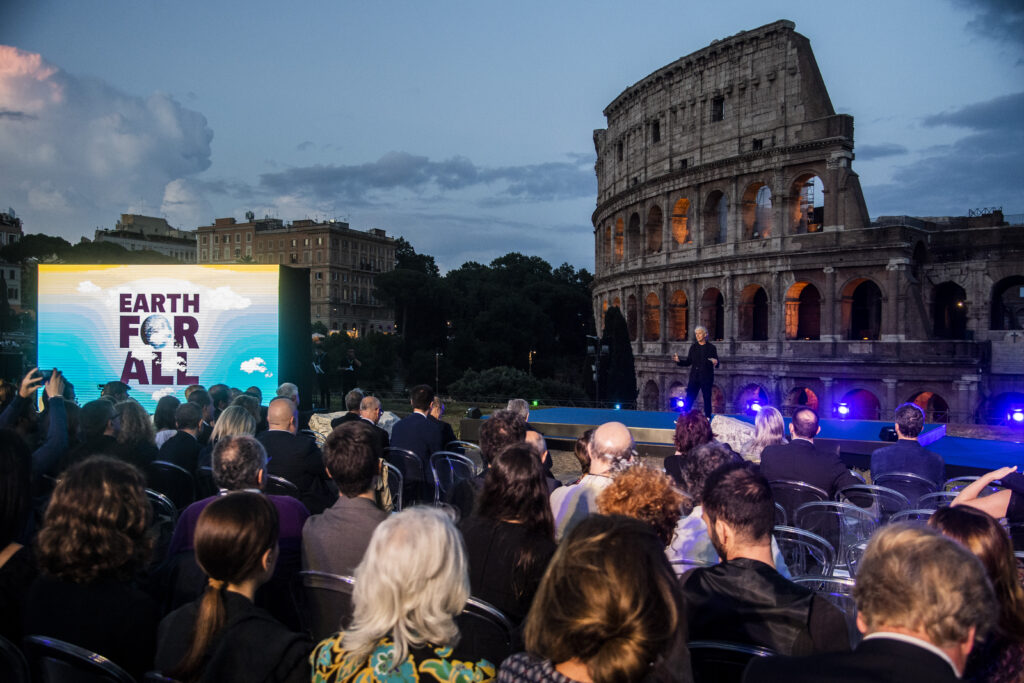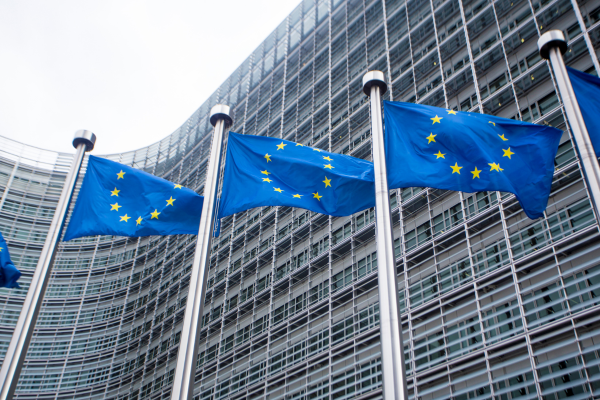The Earth4All report is out!
After two years in the making, on September 20th, we published the results of our research in Earth for All: A Survival Guide for Humanity.
Last month the Earth4All team took part in the New York City Climate Week to discuss the analysis of our 5 turnarounds, and the economic levers that can drive them, with policymakers, scientists, civil organisations and citizens from around the world.
On this page, you will find the take-aways from the events and conferences our contributors joined, as well as the recordings of the sessions when available.
Next we need to build up the momentum around systems change and bring it to the policy-making arenas of the world. Together, let’s build a future of wellbeing for all within planetary boundaries. You can sign-up as a supporter on our homepage, or find more ways to engage here.
Future Lab Day at ARS Electronica 2022 – Welcome to Planet B
Panel: Friedrich Hinterberger, Vice-President of the Austrian chapter of the Club of Rome (moderator); Jayati Ghosh, Development Economics, Professor of Economics, co-author of Earth for All: A Survival Guide for Humanity, and member of the Earth4All Transformational Economics Commission; Maria Langsenlehner, Project Director at Umweltdachverband; Astrid Rössler, Environment Spokesperson with Grüner Club im Parliament.
In this talk, part of the ARS Electronica Festival for Art, Technology and Society, a panel of speakers discussed the economic facet of the transition at the global level, European level, and the national Austrian level, each providing concrete steps to move towards a fairer and stable future.
“We need to change international architecture and institutions to make sure that these turnarounds happen. Inequality is at the heart of the problem, and we can address these inequalities – locally, regionally, and most of all globally” stated Jayati Ghosh.
“We need a global tax deal, that will enable countries to tax the very rich. I’m not talking about the top 10%, just tax the top 1%, or the top 0,1%. Taxing just 4% of the top 0,1% – an amount that wouldn’t be noticeable to them- would be enough to finance the energy turnaround, globally.” she added. “We demand regulation of large capital, which is currently undermining all the efforts to move towards a green transition.”
This panel discussion followed a presentation by Earth4All Project Coordinator Till Kellerhoff (watch here) and the keynote speech by Transformational Economics Commission member Ernst Ulrich von Weizsäcker (watch here).
Forsaken Futures – by Project Syndicate
In this session titled ‘Justice Underwater’, climate activist Fatima Faraz Hati, former President of Costa Rica Laura Chinchilla, former President of the Maldives Mohamed Nasheed, Co-Founder of 350.org Bill McKibben and climate activist Shaama Sandooyea joined Earth4All Project Lead Sandrine Dixson-Declève to discuss climate loss and damage, bringing in perspectives of vulnerable countries and islands, and dimensions of climate finance and inequality.
“We need to look at not just the unjust climate impacts, but the lack of equality, and the poverty issues that have been growing and yet haven’t been addressed.” – Sandrine Dixson-Declève said. “Even in the West, climate-related impacts are hitting the most vulnerable groups.”
“We don’t have the privilege anymore of focusing on mitigation measures. These extreme climate events impact the healthcare system, the food system and security, the living of people.” added young climate activist Shaama Sandooyea. “When talking about the climate crisis, we are talking about injustice, about countries who aren’t emitting much yet experience disproportionate consequences.”
Looking at solutions and next steps, Sandrine stated:
“There is a variety of ways in which we can address trade deficits and debt, within the Southern countries, or as we say ‘most of the world’. These countries are cash-trapped and are having difficulties building that resilience. (…) We need to think clearly about restructuring our economy. As our book says, we need to start talking about the elephant in the room, taxing the 1% wealthiest, across the globe and nationally. At the same time, we need to think about ways to put in stability boards, and loss and damage financing facilities, to ensure that while we are adapting and shifting our economic structure, we are compensating for loss and damage.”
Health and Wealth of Our Planet – a Techonomy event
In this event hosted by Techonomy and Worth, Earth4All Project Lead Sandrine Dixson-Declève presented the Earth4All initiative 50 years after The Limits to Growth report.
“When you look at the scenarios for 2020 in The Limits to Growth, you can see exactly the tipping points that we are seeing now. Weather events, social tipping points – the projections hold today.” said Sandrine. “All the warning signs were there, that the profit motive, which is the essence of neoliberal economics, would continue to stimulate that growth paradigm.”
“The Earth4All Giant Leap is a scenario where we up the bar. Upping the bar is not just through technological innovation, it’s making sure that we address 5 key turnarounds that will bring us to what we call wellbeing economies. Our research shows that a wellbeing economy, that fosters and services people, planet and prosperity rather than just profit, is possible.” she said.
Five turnarounds for prosperity on a healthy planet – Earth4All at the UNGA Science Summit
Hosted by the Permanent Missions to the UN of Spain and Costa Rica together with Earth4All, this event at the United Nations General Assembly’ Science Summit gathered policy-makers and leaders to discuss the concrete actions that are needed to upgrade our economic systems, and transition to wellbeing economies.
Earth4All Project Leaders presented the systems dynamics model central to the initiative, with a focus on the interdependencies between the natural world, the societal responses and the global economy and their implications for policy responses to the social and environmental crises.
“If social tension goes up, wellbeing goes down, and so does trust. This hampers the rate and speed of public policy action. This is quantified in our model which enables us to examine it in light of more variables and feedback loops.” explained Per Espen Stoknes.
Per Espen Stoknes went on to present other dimensions of the systems modelling of Earth4All, including the Wellbeing Index and the Social Tension Index.
“How do we transition from the intellectual goods, the system dynamic modelling, the stress-testing of our Transformational Economics Commission, towards the implementation of a future for all?” asked Sandrine, opening the policy-facet of the event.
“We need to think about optimisation of all the solutions, across the different systems. The turnarounds can achieve wellbeing for all, a shift from the current GDP model to an economic model that takes into consideration indicators that are environmental, social and economic”.
“The next step is to gather broad political support – this is about an economic transformation. It is possible. In the last pandemic, we witnessed fast transformation. We can get the political support we need to find the narrative that will support our political leaders in moving forward. We have to work with them, but also hold them accountable.” she concluded.
Sint Maarten Prime Minister Jacobs was then invited on the stage to share reflections from a Small Island Developing State (SIDS) perspective:
“Sint Maarten and the other SIDS produce less than 0.1% of global emissions, but we face hurricanes, massive floodings and other climate disasters. We have to take out huge insurances for excessive rainfall, earthquakes and hurricanes, insurances which are only triggered once the damage is in the millions of dollars. We have to get loans from kingdom partners. Finding ways to bring the money where it is needed without burdening small countries with loans that they can never repay and from whence wealth was garnered from in the first place, is for us very important. We need a voice in these discussions.”
Sandrine Dixson-Declève then facilitated a discussion with Costa Rican Vice-minister of Multilateral Affairs Christian Guillermet Fernández, leading environmental scientist Johan Rockström, ITUC general secretary Sharan Burrow and Director of the Common Agenda Team at the UN Secretary-General Michele Griffin. Watch the panel discussion:
Earth4All: one future, two scenarios, one choice – a We Don’t Have Time broadcast
In this We Don’t Have Time Climate Week NYC broadcast, speakers explored the hottest topics leading up to COP27. Is ESG driving climate action, or is it just helping companies greenwash? Is the future of food climate neutral? How do we upgrade our economic system and move beyond measures like GDP to address the climate crisis?
Earth4All contributors were invited to take the stage to present the initiative and the report.
Earth4All project leads Per Espen Stoknes and Dixson-Declève gave an overview of the initiative. This was followed by a discussion facilitated by host Nick Nuttall with Earth4All Transformational Economics Commissioner and Schneider Electrics VP of ESG Research Gaya Herrington, Associate Professor of economics at Denison and President of the Global Institute for Sustainable Prosperity Fadhel Kaboub and Economics and Policy Lead at the Wellbeing Economy Alliance Amanda Janoo.
The panellists reflected on the responsibilities of the transition, the global financial flows, the paths towards wellbeing, and the concrete next steps to be carried on by governments and private actors.
Watch the panel discussion here.
Limits and Beyond: Economic Architecture for a Regenerative Future – with Columbia Climate School
This event reflected on 50 years since The Limits to Growth report, and 78 years since the Bretton Woods agreement. Sandrine Dixson-Declève explained the systems approaches needed to address today’s complex challenges and the compound effects of today’s environmental, health and social tipping points to a system that enables humanity and the planet to both survive and thrive. She presented the 5 extraordinary turnarounds on poverty, inequality, empowerment, food, and energy from Earth for All that trailblazes a complementary path forward to a world that is more egalitarian, inclusive, and regenerative.
Finance experts Frank van Gansbeke and James Vaccaro then complemented this need for a new economic architecture with deep shifts in our current Bretton Woods institutions and financial framework that underpins an economy and financial system that services people, planet and prosperity first and foremost.
Multi-Solving for Permacrisis – a Solutions House event
In our age of permanent crisis, we cannot afford to be ‘single issue’ solvers. The concept of ‘multi-solving’ seeks to build long-term resilience while delivering short-term wellbeing and justice.
Earth4All project leader and co-president of The Club of Rome Sandrine Dixson-Declève, president of Natural Capitalism Solutions Hunter Lovins, co-founder and chief solutionist at Futerra Solitaire Townsend, and co-founder of the Apolitical Foundation Lisa Witter delved into how multisolves work.
Earth4All at the New York Stock Exchange
In collaboration with partners Newday Impact and Pottinger, authors of Earth for All joined the Newday team in ringing the honorary New York Stock Exchange closing bell.
Sandrine Dixson-Declève addressed the audience with words of hope:
“There is a way to truly value our future. There is a way to use the power of markets to drive rapid change, to drive new solutions. We need to move from winner takes all, to Earth for All.”



